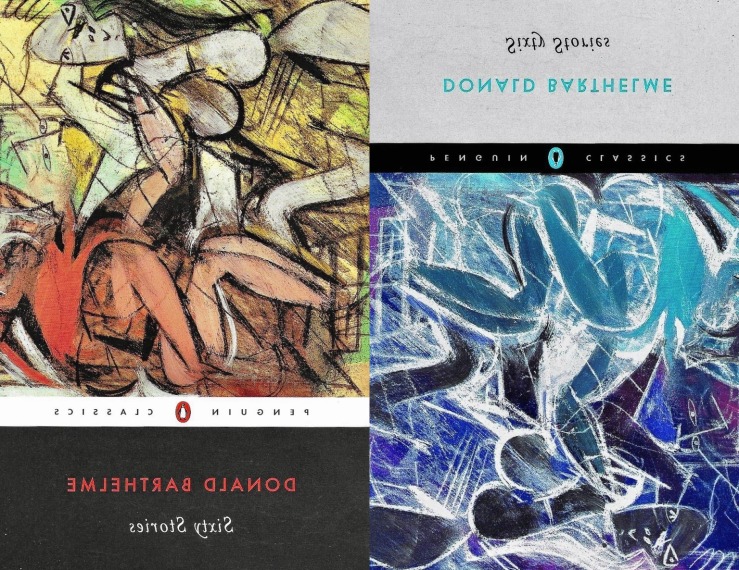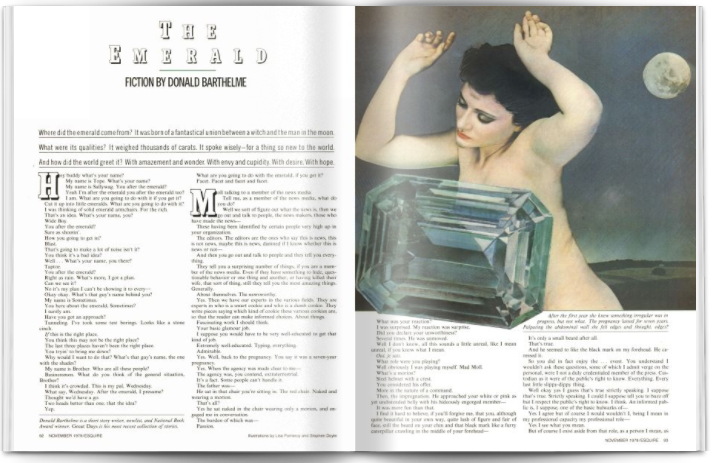The Atlantic released a list of “The Great American Novels” today, purportedly covering the last one hundred years of American fiction. The list is not terrible, but lists as organizing principles are always up for interrogation.
1924
The Atlantic
did not select a novel from 1924 for their list, despite their claim that they “narrowed our aperture to the past 100 years.” That’s fine.
Biblioklept’s selection
Billy Budd, Herman Melville.
Okay, look, Melville died in 1891. But his marvelous novella wasn’t published until 1924. So let its inclusion at the outset of this list bear a trace of resentment and ridicule to all such lists. Great fuckin’ book.
1925
The Atlantic selected
The Great Gatsby, F. Scott Fitzgerald
An American Tragedy, Theodore Dreiser
The Making of Americans, Gertrude Stein
Biblioklept selects
The Great Gatsby, F. Scott Fitzgerald
1926
The Atlantic selected
nothing, just like for 1924
Biblioklept selects
The Sun Also Rises, Ernest Hemingway
1927
The Atlantic selected
Death Comes for the Archbishop, Willa Cather
Biblioklept selects
Death Comes for the Archbishop, Willa Cather
Cather’s novel is the right pick, but let’s give an honorable mention to the first of Franklin W. Dixon’s Hardy Boys books, The Tower Treasure.
1928
The Atlantic selected
nothing again
Biblioklept selects
Quicksand, Nella Larsen
1929
The Atlantic selected
A Farewell to Arms, Ernest Hemingway
Passing, Nella Larsen
The Sound and the Fury, William Faulkner
Biblioklept selects
A Farewell to Arms, Ernest Hemingway
Passing, Nella Larsen
The Sound and the Fury, William Faulkner
Wonderful trifecta there of great novels that are thematically very, very American.
1930-35
The Atlantic selected
nothing for these five years.
Biblioklept selects
1930 — As I Lay Dying, William Faulkner
1931 — Nothing (not gonna give it to Faulkner’s Sanctuary)
1932 — Light in August, William Faulkner
1933 — The Thin Man, Dashielle Hammett
1934 — Tropic of Cancer, Henry Miller; The Postman Always Rings Twice, James M. Cain
1935 — Little House on the Prairie, Laura Ingalls Wilder
1936
The Atlantic selected
Nightwood, Djuna Barnes
Absalom, Absalom!, William Faulkner
Biblioklept selects
Nightwood, Djuna Barnes
Absalom, Absalom!, William Faulkner
In Dubious Battle, John Steinbeck
1937
The Atlantic selected
East Goes West, Younghill Kang
Their Eyes Were Watching God, Zora Neale Hurston
U.S.A., John Dos Passos
Biblioklept selects
Their Eyes Were Watching God, Zora Neale Hurston
Of Mice and Men, John Steinbeck
1938
The Atlantic selected
nothing
Biblioklept selects
The Yearling, Marjorie Kinnans Rawlings
(Could just be the Floridian in me).
1939
The Atlantic selected
Ask the Dusk, John Fante
The Big Sleep, Raymond Chandler
The Day of the Locust, Nathanael West
The Grapes of Wrath, John Steinbeck
Biblioklept selects
The Grapes of Wrath, John Steinbeck
Finnegans Wake, James Joyce
(If The Atlantic can choose Watchmen, the work of two Englishmen, as one of the Great American Novels, I am more than licensed to claim Finnegans Wake.)
1940
The Atlantic selected
Native Son, Richard Wright
The Heart Is a Lonely Hunter, Carson McCullers
Biblioklept selects
Native Son, Richard Wright
1941
The Atlantic selected
again, nothing.
Biblioklept selects
Mildred Pierce, James M. Cain
1942
The Atlantic selected
A Time to Be Born, Dawn Powell
Biblioklept selects
The Runaway Bunny, Margaret Wise Brown
As American literary critics like Leslie Fiedler and Arnold Weinstein have pointed out, there’s a strong streak of the will to escape that courses throughout American literature—escape into the wild, escape into new frontiers, yes, but also to escape from the “sivilizin'” powers of domesticity that Huck Finn tries to evade when he vows to “light out to the Territory ahead of the rest.” We find it in Ishmael taking to the sea, Queequeg his wife; we find in so much of Hemingway; we find it in all of Faulkner, whose heroes repudiate generation itself. The hero of Margaret Wise Brown’s wonderful fable is another such hero, an American Hero, aiming to light out for the Territory himself.
1943-45
The Atlantic selected
nothing again.
Biblioklept selects
1943 — Two Serious Ladies, Jane Bowles
1944 — Strange Fruit, Lillian Smith
1945 — Black Boy, Richard Wright
1946
The Atlantic selected
All the King’s Men, Robert Penn Warren
The Street, Ann Petry
Biblioklept selects
Paterson, William Carlos Williams
1947
The Atlantic selected
In a Lonely Place, Dorothy B. Hughes
The Mountain Lion, Jean Stafford
Biblioklept selects
Under the Volcano, Malcolm Lowry
How in the fuck could those hacks at The Atlantic overlook this US American masterpiece! What the hell are they even doing over there! I reviewed the novel thirteen years ago here, arguing that—
For all its bleak, bitter bile, Volcano contains moments of sheer, raw beauty, especially in its metaphysical evocations of nature, which always twist back to Lowry’s great themes of Eden, expulsion, and death. Lowry seems to pit human consciousness against the naked power of the natural world; it is no wonder then, against such a grand, stochastic backdrop, that his gardeners should fall. The narrative teems with symbolic animals — horses and dogs and snakes and eagles — yet Lowry always keeps in play the sense that his characters bring these symbolic identifications with them. The world is just the world until people walk in it, think in it, make other meanings for it.
What a great American novel!!!
…Wait what the fuck Lowry was English?
1948-50
The Atlantic selected
nada.
Biblioklept selects
1948 — nada
1949 — Death of a Salesman, Arthur Miller
A horrible play, truly wretched, but very American.
— Killers of the Dream, Lillian Smith
1950 — Strangers on a Train, Patricia Highsmith
1951
The Atlantic selected
The Catcher in the Rye, J.D. Salinger
Biblioklept selects
The Catcher in the Rye, J.D. Salinger
End the boring discourse! It’s a novel, not a moral map!
1952
The Atlantic selected
Charlotte’s Web, E.B. White
Invisible Man, Ralph Ellison
Biblioklept selects
Invisible Man, Ralph Ellison
1953
The Atlantic selected
Fahrenheit 451, Ray Bradbury
Maud Martha, Gwendolyn Brooks
The Adventures of Augie March, Saul Bellow
Biblioklept selects
nada.
1954
The Atlantic selected
nothin’.
Biblioklept selects
nothin’.
1955
The Atlantic selected
Lolita, Vladimir Nabokov
Biblioklept selects
The Recognitions, William Gaddis
1956
The Atlantic selected
Giovanni’s Room, James Baldwin
Peyton Place Grace Metalious
Biblioklept selects
Howl, Allen Ginsberg
Don’t give me any That’s not a novel, Ed shit. It’s a novel.
1957
The Atlantic selected
Deep Water, Patricia Highsmith
No-No Boy, John Okada
On the Road, Jack Kerouac
Biblioklept selects
On the Road, Jack Kerouac
1958
The Atlantic selected
zip.
Biblioklept selects
I mean I guess I could give it to Kerouac’s The Dharma Bums, which I don’t think is that great but is definitely of its time, or Terry Southern’s Candy (ditto), but let’s just give a general early award to Charles M. Schulz’s strip Peanuts.
1959
The Atlantic selected
The Haunting of Hill House, Shirley Jackson
Biblioklept selects
Naked Lunch, William S. Burroughs
The Sirens of Titan, Kurt Vonnegut
The Real Cool Killers, Charles Himes
The Haunting of Hill House, Shirley Jackson
1960
The Atlantic selected
nothing.
Biblioklept selects
The Sot-Weed Factor, John Barth
And look, To Kill a Mockingbird might have some huge problems, but not putting it on the list is a choice.
1961
The Atlantic selected
Catch-22, Joseph Heller
Biblioklept selects
Catch-22, Joseph Heller
The Phantom Tollbooth, Norton Juster
1962
The Atlantic selected
A Wrinkle in Time, Madeleine L’Engle
Another Country, James Baldiwin
One Flew Over the Cuckoo’s Nest, Ken Kesey
Pale Fire, Vladimir Nabokov
The Zebra-Striped Hearse, Ross MacDonald
Biblioklept selects
Pale Fire, Vladimir Nabokov
Mother Night, Kurt Vonnegut
We Have Always Lived in the Castle, Shirley Jackson
1963
The Atlantic selected
The Bell Jar, Sylvia Plath
The Group, Mary McCarthy
Biblioklept selects
Where the Wild Things Are, Maurice Sendak
Cat’s Cradle, Kurt Vonnegut
1964-65
The Atlantic selected
nothing.
Biblioklept selects
1964 — Nothing.
1965 — Everything that Rises Must Converge, Flannery O’Connor
So, okay, so novels is there in the list’s title. But: O’Connor’s better medium was stories, and she was a master. The stories in Everything converge intro a clear aesthetic statement clearer and better and more intense than most novels of 1965. Or now.
1966
The Atlantic selected
The Crying of Lot 49, Thomas Pynchon
Biblioklept selects
Omensetter’s Luck, William H. Gass
Norwood, Charles Portis
The Crying of Lot 49, Thomas Pynchon
Babel-17, Samuel R. Delany
1967
The Atlantic selected
A Sport and a Pastime, James Salter
Biblioklept selects
The Free-Lance Pall Bearers, Ishmael Reed
The Outsiders, S.E. Hinton
1968
The Atlantic selected
Couples, John Updike
Do Androids Dream Electric Sheep?, Philip K. Dick
Biblioklept selects
Do Androids Dream Electric Sheep?, Philip K. Dick
A Wizard of Earthsea, Ursula K. Le Guin
True Grit, Charles Portis
1969
The Atlantic selected
Divorcing, Susan Taubes
Portnoy’s Complaint, Philip Roth
Slaughterhouse-Five, Kurt Vonnegut
Biblioklept selects
The Left Hand of Darkness, Ursula K. Le Guin
Slaughterhouse-Five, Kurt Vonnegut
Fat City, Leonard Gardner
1970
The Atlantic selected
Are You There God? It’s Me Margaret, Judy Blume
Desperate Characters, Paula Fox
Play It as It Lays, Joan Didion
Biblioklept selects
The Bluest Eye, Toni Morrison
1971
The Atlantic selected
not even one novel.
Biblioklept selects
Fear and Loathing in Las Vegas, Hunter S. Thompson
Grendel, John Gardner
1972
The Atlantic selected
Mumbo Jumbo, Ishmael Reed
Log of the S.S. Mrs. Unguentine, Stanley Crawford
Biblioklept selects
Mumbo Jumbo, Ishmael Reed
Motorman, David Ohle
1973
The Atlantic selected
Sula, Toni Morrison
The Revolt of the Cockroach People, Oscar Zeta Acosta
Biblioklept selects
Gravity’s Rainbow, Thomas Pynchon
Sula, Toni Morrison
Breakfast of Champions, Kurt Vonnegut
Child of God, Cormac McCarthy
State of Grace, Joy Williams
There Is a Tree More Ancient Than Eden, Leon Forrest
1974
The Atlantic selected
Oreo, Fran Ross
The Dispossessed, Ursula K. Le Guin
Winter in the Blood, James Welch
Biblioklept selects
The Dispossessed, Ursula K. Le Guin
Dog Soldiers, Robert Stone
Oreo, Fran Ross
The Last Days of Louisiana Red, Ishmael Reed
Where the Sidewalk Ends, Shel Silverstein
1974-2024 to come, although I will probably not offer too much on anything published after 2000.



























